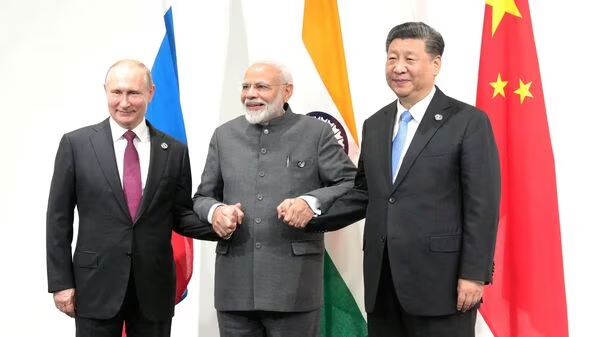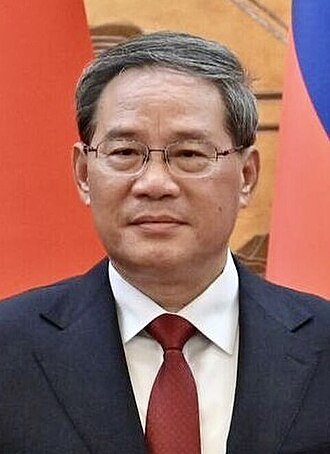All eyes will be on how US President Joe Biden pursues his India-friendly gestures at an event to be hosted by Prime Minister Narendra Modi and the same time maintain the perceived American balance seen through the prism of Washington - vis-a-vis Russia's war with Ukraine and overall global economic situation and the Chinese factor in that.
But Sept 9-10 Delhi Summit of G-20 will also provide world stage to two 'second rung' leaders in their respective countries Li Qiang, Chinese premier, and Russian foreign minister Sergey Lavrov, to shake hands and rub shoulders with possibly a few most powerful leaders on the planet.
Both Russia and China have their own challenges. Even as much analysis have been made about Chinese president Xi Jinping skipping the summit, there is no denying that all that glitters may not be gold for Beijing.
It is worth taking note that China’s economy is faltering after years of pandemic-induced isolation and some policy 'fault lines' under otherwise a confidant communist dictator Xi Jinping. US President Biden has already called the emerging situations a “ticking time bomb” for the rest of the world.
Li Qiang took over as premier in March this year. Since taking office, the Chinese leader has focused on wooing foreign businesses. He has pledged among other things the need to “take a long-term view” on the nation. He has also sought to dispel fear among the global business community that a war over Taiwan is imminent.
China, he said, is “an anchor for world peace and development.” In his keynote speech at a World Economic Forum conference in China's Tianjin in June, Li took a statesman like approach and had said, "....the impact of COVID-19 still lingers. Unilateralism, protectionism and de-globalization are on the rise. Global challenges are escalating, and regional conflicts keep flaring up. Instability, uncertainty and unpredictability have become commonplace".
He also said, "For most countries, the aspiration for win-win cooperation has grown even stronger. The world is standing at a historical crossroads. How should humanity navigate such turbulent times is a crucial issue of shared concern for all".
"What is lacking in today’s world is communication, not estrangement; cooperation, not confrontation; openness, not isolation; peace, not conflict."
Analysts point out that during his first overseas trip as premier to Germany in June, Li secured an agreement from Chancellor Olaf Scholz to deepen cooperation in manufacturing, electric vehicles and green finance. That came just weeks before Berlin adopted a more cautious China stance, which characterized the world’s second-largest economy as a “partner, competitor and systemic rival.”
 |
| Namo to miss two key RIC leaders |
China is the world’s largest developing country. It has a population of over 1.4 billion. But admittedly, its per capita economic indicators and living standards are only modest, and its development remains unbalanced.
Its also crucial to note that in the first year of the COVID-19 pandemic, China was the only major economy that registered a positive growth. In the past three years, Beijing ensured an average annual growth of 4.5 percent, about 2.5 percentage points higher than the world average. Li Qiang himself says that China was also among the best performers of the world’s major economies.
Hence, what unfolds from Li's end will remain an exciting part of the Summit. However, as Xi has skipped the event, nothing drastic can be expected from Li either.
Sun Yun, a senior fellow and director of the China Program at the Washington-based Stimson Center, said,“I don’t expect him to announce anything significant diplomatically or security-wise,”
In a contrasting but almost similar situation is Russian foreign minister Lavrov, who will attend the Summit as Russian President Vladimir Putin facing an international 'warrant' is also not coming.
 |
| Dr Jaishankar and Russian counterpart Lavrov |
Russia has its own sets of challenges. However, at the global stage heightened disagreements concerning Russia's military intervention in Ukraine does pose a major challenge to the advancement of critical global issues like food security, mounting debt concerns, and any comprehensive effort to address climate change.
Skeptics are already trying to label Delhi meet as a 'failed summit' that could expose the limits of cooperation between Western and non-Western powers. How will Sergey Lavrov his 'part' of diplomacy remains to be seen.
He has already served as the foreign minister of Russia since 2004. He is the longest-serving foreign minister since the Tsarist era. He also has the experience of serving as the permanent representative of Russia to the United Nations from 1994 to 2004.
In October 2022, Lavrov hit headlines when he said he hopes US President Joe Biden will have the wisdom to deal with a global confrontation similar to the 1962 Cuban missile crisis in reference to the war on Ukraine.
Russia’s invasion of Ukraine has triggered the biggest hostilities between Moscow and Washington and the West since the Cuban crisis, when the then Soviet Union and the United States had come close to a nuclear war.
Reports say in 1962 the then US President John F Kennedy had discovered that Soviet leader Nikita Khrushchev had deployed nuclear missiles on Cuba after the failed Bay of Pigs invasion – a US-backed coup attempt by Cuban exiles to overthrow the communist leadership.
In the Indian context, President Putin and PM Narendra Modi have maintained good personal rapport talking to each other over phone time to time. Moscow has generally not protested over India's supposed leaning to the US especially last few years.
Meera Shankar, who was India's second woman Ambassador to the United States having served from April 26, 2009 to 2011; says, "It is known we have strategic equities in Russia and we have been able to explain to the US that our (India's) stand is not anti-western stance. But a stand that looks to protect India's strategic interest".
It is something in tune with what Dr Jaishankar had said, New Delhi's stance in this war is not a 'neutral stand' either. "India's stand is in favour of India". Nothing can be more truthful. About 60 per cent of India's defence equipment is of Russian origin. There is no way India can ignore this fact.
ends






No comments:
Post a Comment